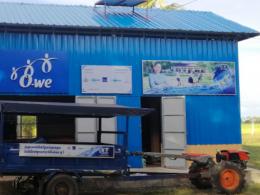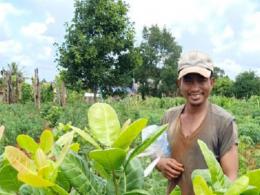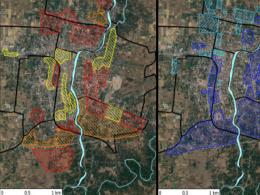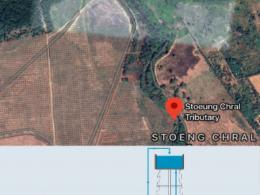Reducing the vulnerability of Cambodian rural livelihoods through enhanced sub-national climate change planning and execution of priority actions (SRL)
Background
Cambodia is one of the poorest nations in South-East Asia. Approximately 70% of Cambodian households derive all or an important part of their income from agriculture and the majority of agricultural production is dependent on the monsoon rain and natural floods/recession of the Tonle Sap River and Lake. Climate change is likely to disrupt the natural cycle of the monsoonal system and the hydrological function of the interconnected Mekong-Tonle Sap River drainage system and therefore cause a significant impact on the livelihood and welfare of rural Cambodians.
This project has been designed to reduce the vulnerability of rural Cambodians, especially land-poor, landless and/or women-headed households. This will be achieved through investments in small-scale water management infrastructure, technical assistance to resilient agricultural practices, and capacity building support, especially targeting poor women, for improved food production in home gardens. Importantly, these services will be delivered by sub-national administrations (communes, districts and provinces) with a view to strengthen their overall capacity to plan, design and deliver public services for resilience building.
The Department of Climate Change (DCC) of the General Secretariat of the National Council for Sustainable Development (NCSD), chaired by Ministry of Environment (MoE) is the Implementing Partner, with support from a number of key technical Ministries including the Ministry of Agriculture, Forestry and Fisheries, the Ministry of Water Resources and Meteorology, etc. To ensure cross-sectoral integration, responsiveness to local needs and sustainability, sub-national activities of the Project will be integrated with the National Programme for Sub-National Democratic Development (NP-SNDD) under the coordination of National Committee for Sub-National Democratic Development Secretariat (NCDDS). The Project will be implemented in 89 communes and 10 districts of Siem Reap and Kampong Thom provinces over a four-year period.
Overall Objective
To improve sub-national administration systems affecting investments in rural livelihoods through climate sensitive planning, budgeting and execution.
Expected Results
- Climate sensitive planning, budgeting and execution at sub-national level strengthened;
- Resilience of livelihoods of the most vulnerable improved against erratic rainfall, floods and droughts; and
- Incentive mechanism is in place at sub-national level to manage greater volume of climate change adaptation financing aligned with local development plans.
Location
Kampong Thom and Siem Reap Provinces
Beneficiaries
6,000 households (poor and vulnerable households)
Approach
1.1 Improve the capacity of sub-national councils (communes and districts) and Planning and Commune Support Units in two provinces for climate sensitive development planning and budgeting.
1.2 Enhance technical capacity of agricultural extension officers and grass-roots NGOs for climate-resilient livelihood techniques and sustainable assistance to communities.
1.3 Enhance technical capacity to execute climate resilient water infrastructure design and construction for about 50 Government technical officials and private contractors.
1.4 Establish knowledge management platform for sub-national Climate Change Adaptation (CCA) Planning and resilient livelihoods support.
2.1 Design and put in place climate-resilient small-scale water infrastructure in at least 10 districts following the resilient design standards specifically targeting rain-fed farmers.
2.2 Demonstrate climate-resilient livelihood measures in at least 10 districts targeting landless women and farmers practicing rain-fed agriculture.
3.1 Strengthen and apply performance-based adaptation financing mechanism in 10 districts covering 89 communes and integrated into the enhanced climate-smart development planning.
3.2 Enhance the capacity of Districts for self-monitoring of climate change adaptation and resilient livelihood support.
Achievements to date
- A total of 389 provincial, district and commune councilors (129 women – 33%) have been actively involved in the process of integrating CCA into local planning and execution of CCA priorities. As a result to date, 40 commune investment programmes (CIPs) and 10 district investment programmes (DIPs) have been integrated with CCA and disaster risk reduction (DDR) using findings from vulnerability reduction assessment (VRA) and district vulnerability mapping.
- The project’s baseline data to measure the impact of the project was established and baseline survey report is now available. The survey involved a total of 1,563 household respondents, a combination of 726 treatments, 422 control-1, and 415 control-2 households in both target provinces.
- Technical capacity of agricultural extension officers and livelihood service provider have been enhanced for climate-resilient livelihood to provide support to the local communities through a series of capacity building workshops on beneficiary selection and resilient agriculture extension packages. As a result, total of 115 extension officers, service provider staff, and Sub-National Administration staff (34 women—30%) are able to facilitate and provide technical support to project beneficiaries.
- Twenty-eight farmer groups (Farmer Water User Community, Livelihood Improvement Group, Water User Committee, Smallholder learning group, and Saving group) are formed with a total of 825 households (78% of households are represented by women) and their needs have been assessed. Farmer training and provision of farm inputs will follow.
- Forty-nine small-scale water infrastructures are being built (19) and renovated (30) in 10 districts. The project has invested USD 900,000 through co-financing mechanism—Performance Based Climate Resilient grant (PBCR).






